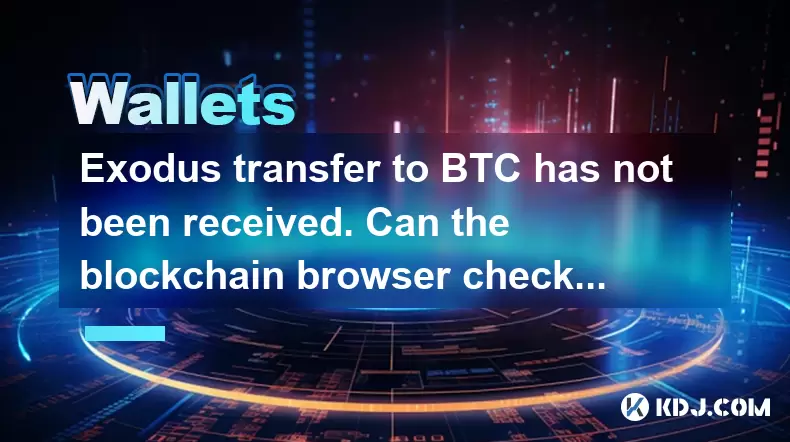-
 Bitcoin
Bitcoin $115000
0.12% -
 Ethereum
Ethereum $3701
4.50% -
 XRP
XRP $3.081
2.99% -
 Tether USDt
Tether USDt $0.0000
-0.01% -
 BNB
BNB $767.9
1.45% -
 Solana
Solana $169.5
3.13% -
 USDC
USDC $0.9999
0.01% -
 Dogecoin
Dogecoin $0.2106
4.30% -
 TRON
TRON $0.3334
1.62% -
 Cardano
Cardano $0.7564
2.54% -
 Stellar
Stellar $0.4165
0.76% -
 Hyperliquid
Hyperliquid $38.75
0.25% -
 Sui
Sui $3.593
3.00% -
 Chainlink
Chainlink $17.08
3.59% -
 Bitcoin Cash
Bitcoin Cash $573.6
4.35% -
 Hedera
Hedera $0.2508
-0.84% -
 Avalanche
Avalanche $23.07
6.46% -
 Ethena USDe
Ethena USDe $1.001
-0.02% -
 Litecoin
Litecoin $120.8
8.17% -
 UNUS SED LEO
UNUS SED LEO $8.943
-0.32% -
 Toncoin
Toncoin $3.400
-5.60% -
 Shiba Inu
Shiba Inu $0.00001255
1.54% -
 Uniswap
Uniswap $9.908
6.32% -
 Polkadot
Polkadot $3.718
2.10% -
 Monero
Monero $303.0
-0.74% -
 Dai
Dai $0.9999
-0.02% -
 Bitget Token
Bitget Token $4.392
0.91% -
 Cronos
Cronos $0.1403
6.31% -
 Pepe
Pepe $0.00001076
1.13% -
 Aave
Aave $267.2
1.80%
Exodus transfer to BTC has not been received. Can the blockchain browser check it?
If your Bitcoin transaction from Exodus seems lost, use a blockchain explorer like Blockchain.com to check its status with the TXID from your wallet's history.
May 14, 2025 at 07:49 pm

Introduction to the Issue
When transferring Bitcoin (BTC) from the Exodus wallet and the transaction appears not to have been received, it can be a source of concern. Understanding the mechanics of blockchain transactions and how to use a blockchain explorer can help in verifying and troubleshooting these issues. This article will guide you through the process of checking a Bitcoin transaction using a blockchain browser, explaining each step in detail.
Understanding Blockchain Transactions
Before diving into the specifics of using a blockchain browser, it's important to understand how Bitcoin transactions work. When you send BTC from Exodus, the transaction is broadcast to the Bitcoin network. Miners then include this transaction in a block, and once the block is added to the blockchain, the transaction is considered confirmed. The number of confirmations required for a transaction to be considered secure varies, but typically, six confirmations are sufficient.
Locating Your Transaction ID
The first step in checking a transaction on a blockchain browser is to locate the transaction ID (TXID). In Exodus, you can find the TXID by following these steps:
- Open the Exodus wallet.
- Navigate to the transaction history.
- Find the transaction in question and click on it.
- Look for the transaction ID or TXID, which is a long string of alphanumeric characters.
The TXID is essential as it uniquely identifies your transaction on the blockchain.
Using a Blockchain Explorer
A blockchain explorer, or blockchain browser, is a tool that allows you to search and view information about transactions, addresses, and blocks on the blockchain. There are several popular blockchain explorers for Bitcoin, such as Blockchain.com, BlockCypher, and BTC.com. To check your transaction, follow these steps:
- Open your preferred blockchain explorer in a web browser.
- Locate the search bar, typically found at the top of the page.
- Enter the TXID you obtained from Exodus into the search bar.
- Press enter or click the search button.
The blockchain explorer will then display detailed information about your transaction.
Interpreting the Transaction Details
Once you've entered the TXID into the blockchain explorer, you will see a page with various pieces of information about your transaction. Here are the key elements to look for:
- Transaction Status: This will indicate whether the transaction is unconfirmed, pending, or confirmed. If it shows as confirmed, it means the transaction has been included in a block.
- Number of Confirmations: This tells you how many blocks have been added to the blockchain since your transaction was included. More confirmations mean a higher level of security.
- Input and Output Addresses: These are the addresses involved in the transaction. The input address is where the BTC came from, and the output address is where the BTC is going.
- Transaction Amount: This is the amount of BTC transferred.
- Transaction Fee: This is the fee paid to miners for processing the transaction.
If your transaction shows as unconfirmed, it may still be in the mempool, waiting to be included in a block.
Troubleshooting Unconfirmed Transactions
If your transaction is unconfirmed, there are a few steps you can take to troubleshoot the issue:
- Check the Transaction Fee: If the fee is too low, miners may not prioritize your transaction. You might need to wait longer for it to be confirmed or consider using a transaction accelerator service.
- Verify the Recipient Address: Ensure that the recipient address was entered correctly. A single incorrect character can result in the transaction being sent to the wrong address.
- Check for Network Congestion: High network congestion can cause delays in transaction confirmations. You can check the current state of the Bitcoin network on various websites.
If the transaction remains unconfirmed for an extended period, you may need to contact Exodus support for further assistance.
Frequently Asked Questions
Q: Can I cancel a Bitcoin transaction if it's stuck in the mempool?
A: Once a Bitcoin transaction is broadcast to the network, it cannot be canceled. However, if it remains unconfirmed for a long time, you may be able to use a transaction accelerator service to increase the fee and encourage miners to include it in a block.
Q: How long should I wait for a Bitcoin transaction to be confirmed?
A: The time it takes for a Bitcoin transaction to be confirmed can vary depending on network conditions and the transaction fee. Typically, you can expect to see at least one confirmation within an hour, but for higher security, waiting for six confirmations is recommended.
Q: What should I do if the recipient says they haven't received the BTC, but the blockchain explorer shows the transaction as confirmed?
A: If the blockchain explorer shows the transaction as confirmed and sent to the correct address, but the recipient claims not to have received it, the issue may be on their end. They should check their wallet to ensure it is syncing properly with the blockchain and that the address used is correct.
Q: Can I use any blockchain explorer to check my Bitcoin transaction?
A: Yes, you can use any reputable blockchain explorer to check your Bitcoin transaction. Popular options include Blockchain.com, BlockCypher, and BTC.com. Each provides similar functionality, so you can choose the one that is most convenient for you.
Disclaimer:info@kdj.com
The information provided is not trading advice. kdj.com does not assume any responsibility for any investments made based on the information provided in this article. Cryptocurrencies are highly volatile and it is highly recommended that you invest with caution after thorough research!
If you believe that the content used on this website infringes your copyright, please contact us immediately (info@kdj.com) and we will delete it promptly.
- Velo Universe, DEX, and DeFi Security: Navigating the Future of Decentralized Trading
- 2025-08-05 09:25:13
- Bitget Wallet Revolutionizes Solana with Gas-Free Transactions: A New Era for DeFi
- 2025-08-05 09:25:13
- Ozak AI, Crypto Boom, and ROI Potential: Is This the Next Big Thing?
- 2025-08-05 09:25:24
- Solana's ETF Hopes & the All-Time High Chase: Is SOL Set to Soar?
- 2025-08-05 09:25:24
- Coinbase's Brian Armstrong and the Art of Focused Work: A Deep Dive
- 2025-08-05 09:25:30
- Uniswap Price Prediction: Bullish Reversal on the Horizon?
- 2025-08-05 09:25:30
Related knowledge

How to add TRC20 token to Trust Wallet?
Aug 04,2025 at 11:35am
Understanding TRC20 and Trust Wallet CompatibilityTrust Wallet is a widely used cryptocurrency wallet that supports multiple blockchain networks, incl...

What is a watch-only wallet in Trust Wallet?
Aug 02,2025 at 03:36am
Understanding the Concept of a Watch-Only WalletA watch-only wallet in Trust Wallet allows users to monitor a cryptocurrency address without having ac...

Why can't I connect my Trust Wallet to a DApp?
Aug 04,2025 at 12:00pm
Understanding DApp Connectivity and Trust WalletConnecting your Trust Wallet to a decentralized application (DApp) is a common process in the cryptocu...

How to fix a stuck pending transaction in Trust Wallet?
Aug 03,2025 at 06:14am
Understanding Why Transactions Get Stuck in Trust WalletWhen using Trust Wallet, users may occasionally encounter a pending transaction that appears t...

What is a multi-coin wallet in Trust Wallet?
Aug 03,2025 at 04:43am
Understanding Multi-Coin Wallets in Trust WalletA multi-coin wallet in Trust Wallet refers to a digital wallet that supports multiple cryptocurrencies...

How to switch between networks in Trust Wallet?
Aug 02,2025 at 12:36pm
Understanding Network Switching in Trust WalletSwitching between networks in Trust Wallet allows users to manage assets across different blockchains s...

How to add TRC20 token to Trust Wallet?
Aug 04,2025 at 11:35am
Understanding TRC20 and Trust Wallet CompatibilityTrust Wallet is a widely used cryptocurrency wallet that supports multiple blockchain networks, incl...

What is a watch-only wallet in Trust Wallet?
Aug 02,2025 at 03:36am
Understanding the Concept of a Watch-Only WalletA watch-only wallet in Trust Wallet allows users to monitor a cryptocurrency address without having ac...

Why can't I connect my Trust Wallet to a DApp?
Aug 04,2025 at 12:00pm
Understanding DApp Connectivity and Trust WalletConnecting your Trust Wallet to a decentralized application (DApp) is a common process in the cryptocu...

How to fix a stuck pending transaction in Trust Wallet?
Aug 03,2025 at 06:14am
Understanding Why Transactions Get Stuck in Trust WalletWhen using Trust Wallet, users may occasionally encounter a pending transaction that appears t...

What is a multi-coin wallet in Trust Wallet?
Aug 03,2025 at 04:43am
Understanding Multi-Coin Wallets in Trust WalletA multi-coin wallet in Trust Wallet refers to a digital wallet that supports multiple cryptocurrencies...

How to switch between networks in Trust Wallet?
Aug 02,2025 at 12:36pm
Understanding Network Switching in Trust WalletSwitching between networks in Trust Wallet allows users to manage assets across different blockchains s...
See all articles

























































































